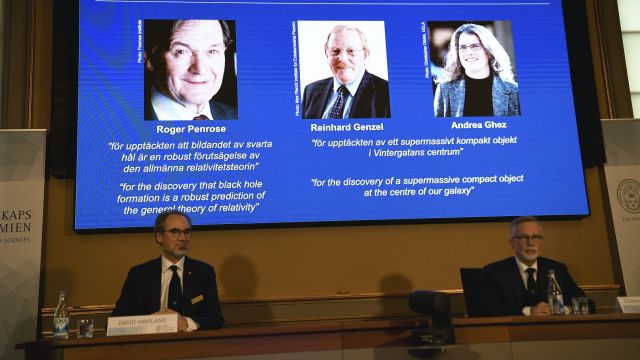The Royal Swedish Academy of Sciences said Sir Roger Penrose will receive half of this year’s prize “for the discovery that black hole formation is a robust prediction of the general theory of relativity”.
BREAKING NEWS:
The Royal Swedish Academy of Sciences has decided to award the 2020 #NobelPrize in Physics with one half to Roger Penrose and the other half jointly to Reinhard Genzel and Andrea Ghez. pic.twitter.com/MipWwFtMjz— The Nobel Prize (@NobelPrize) October 6, 2020
Goran K Hansson, the academy’s secretary-general, said German Reinhard Genzel and American Andrea Ghez will receive the second half of the prize “for the discovery of a supermassive compact object at the centre of our galaxy”.
The prizes celebrate “one of the most exotic objects in the universe”, black holes, which have become a staple of science fiction and science fact and where time even seems to stand still, Nobel committee scientists said.
Sir Roger proved with maths that the formation of black holes was possible, based heavily on Albert Einstein’s general theory of relativity.
Roger Penrose – awarded this year’s #NobelPrize in Physics – was born in 1931 in Colchester, UK.
He is a professor at @UniofOxford, UK.https://t.co/Jm9iOU99N3 pic.twitter.com/Vsm7xHZivv— The Nobel Prize (@NobelPrize) October 6, 2020
“Einstein did not himself believe that black holes really exist, these super-heavyweight monsters that capture everything that enters them,” it said. “Nothing can escape, not even light.”
Sir Roger detailed his studies in 1965, but it was not until the 1990s that Mr Genzel and Ms Ghez, each leading a group of astronomers, trained their sights on the dust-covered centre of our Milky Way galaxy, a region called Sagittarius A*, where something strange was going on.
They both found there was “an extremely heavy, invisible object that pulls on the jumble of stars, causing them to rush around at dizzying speeds”.
It was a black hole – not just an ordinary black hole, but a supermassive black hole, four million times the mass of our sun.
Now scientists know that all galaxies have supermassive black holes.
2020 #NobelPrize laureate Reinhard Genzel was born in 1952 in Bad Homburg vor der Höhe, Germany.
He is Director at the Max Planck Institute for Extraterrestrial Physics, Garching, Germany and a professor @UCBerkeley, USA.https://t.co/g01LKV3pXPhttps://t.co/ELValpTiHB pic.twitter.com/gV3PlaOvJg— The Nobel Prize (@NobelPrize) October 6, 2020
Andrea Ghez, awarded the 2020 #NobelPrize in Physics, was born in 1965 in the City of New York, USA.
She is a professor at @UCLA, Los Angeles, USA. https://t.co/I3XbnIwzYB pic.twitter.com/9dg1t2vAyL— The Nobel Prize (@NobelPrize) October 6, 2020
The prestigious award comes with a gold medal and prize money of 10 million Swedish kronor (£864,000), courtesy of a bequest left 124 years ago by the prize’s creator, Swedish inventor Alfred Nobel. The amount was increased recently to adjust for inflation.
On Monday, the Nobel Committee awarded the prize for physiology and medicine to Americans Harvey J Alter and Charles M Rice and British-born scientist Michael Houghton for discovering the liver-ravaging hepatitis C virus.
The other prizes, to be announced in the coming days, are for outstanding work in the fields of chemistry, literature, peace and economics.







